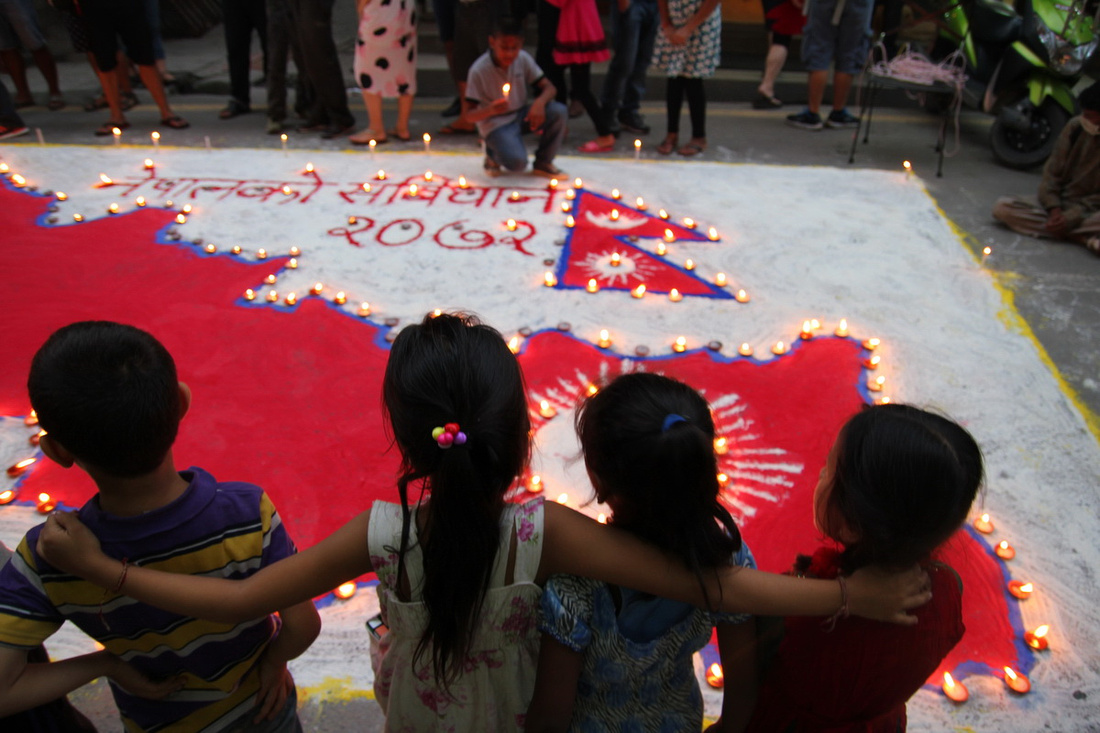
OR
#Constitution Day
Will your daughter look upto to the Constitution of Nepal 2015?
Published On: September 19, 2020 08:46 AM NPT By: Karma Tamang

More from Author
What would be the dream of parents for a daughter born today on constitution day in the middle of a pandemic? Most likely a good health, proper education and of course a perfect husband. If the family is well enough financially, COVID-19 and schooling would probably be a lesser problem. What about the effect of the constitution in the course of her life?
Nepal adopted the present constitution on September 20, 2015, replacing the interim constitution of 2007. After 10 years of internal conflict waged by the Maoists and another eight years of struggle in drafting the new constitution, Nepalis were relieved that the squabbling finally was over. They hoped for a normal life and the rule of law. For others, there were no reasons to be happy since there were still outstanding issues like boundaries of new states and constituencies, electoral representation, affirmative action and citizenship rights.
A major drawback of the constitution is the gender disparity regarding citizenship. If a Nepali man marries a foreign woman, their children will be Nepali with full rights (so-called ‘Bangsaj’ citizenship or citizenship by descent) irrespective of the wife’s nationality and without further conditions. If a Nepali woman marries a foreign man, their children will get only the so-called ‘Angikrit’ citizenship (citizenship by naturalisation) with cropped rights provided they live permanently in Nepal and do not hold citizenship of another country. In Tarai, where many cross-border marriages take place and people have social, economic and cultural ties to Indians just across the border, the citizenship measures affect their daily life. The new constitution also makes it very difficult for a single mother to pass her citizenship to her child. Due to these citizenship problems, along with the unfulfilled demands of revision of provisional boundaries, recognition of regional languages and adequate representation, the constitution is said to have failed to accommodate the historically marginalized Madhesi community.
The Citizenship Amendment Bill that was registered at the parliament in August 2018 was supposed to make the changes. The proposed amendment includes provisions that make it a bit easier for single mothers. But while a foreign wife has to wait for seven years to get a Nepali naturalised citizenship, a foreign husband does not have this privilege. In Nepal, citizenship is required for almost everything from mundane tasks like opening a bank account, buying a sim card to opening a business. Not only that this discriminatory provision impacts more than half of a population, it is in fact against Article 18 of the same constitution according to which “(1) All citizens shall be equal before law.” and “(2) There shall be no discrimination in the application of general laws on the grounds of origin, religion, race, caste, tribe, sex, physical conditions, disability, health condition, matrimonial status, pregnancy, economic condition, language or geographical region, or ideology or any other such grounds.”
Notwithstanding these downsides, the current constitution does have other strengths. The federal democratic republic has been institutionalised and Nepal has a multi-party democratic system. The sovereignty is vested in the people. The executive power lies with the Council of Ministers. The prime minister is the executive head and the president is the ceremonial head of the state. The principle of secularism maintains that the state has no religion, but the people have the liberty to practice a religion of their choice. The citizens have 31 fundamental rights including the right against untouchability and discrimination. It has guaranteed 33 percent political representation of women. Proportional inclusion ensures political representation of Dalit, Adibasi Janajati, Khas Arya, Madhesi, Tharu, Muslim, and backward regions as well as persons with disabilities. Full press freedom and an independent, impartial and competent judiciary. Article 14 gives economic, social and cultural rights to the non-resident Nepalis. There are three types of courts: supreme court in the federal state, high courts in each province and a district court in each district.
Although it would be almost impossible to satisfy all the groups, one can say that Nepal’s current constitution is robust enough to start with. The constitution was a costly enterprise, not only due to the loss of life of several thousands people, the estimated costs for two Constituent Assembly elections was six billion rupees. The way forward seems equally difficult as the current government is busy with internal party conflicts.
The main obstacle in the effective implementation of the constitution seems to be the politicians incognizant of their duties. A member of parliament (MP) is involved in making laws and those locally elected representatives are supposed to implement those laws. However, a majority of current MPs still insist on a budget for their constituency. According to Election Observation Committee Nepal, “the total budget combining provisions to federal and provincial lawmakers stands at 21 billion in the year 2076/77”. The Oli government swiftly introduced two ordinances during a pandemic that was also unconstitutional because it violated Article 284 of the constitution. Further, the constitution clearly forbids the candidates who have lost an election from being a member of parliament. Nevertheless, Narayan Kaji Shrestha and Bam Dev Gautam were nominated in the National Assembly. This goes against the spirit of the constitution.
Hence, to achieve the society as envisaged by the constitution, the government has to set the priorities right. All the rights given by the constitution shall remain a paper tiger if not turned into laws and implemented on the ground consequently. Rights of Dalits (Article 40) will be a joke if they are discriminated against, abused and killed on a regular basis and the local authorities as well as the community look away. A woman today does not get her rights to parental property if the laws are not put into practice (violation of Article 38). The mindset persists that the married daughters have no right to inheritance. The author herself, while requesting a relationship certificate in her home district, was told by the Chief District Officer that her old citizenship certificate was invalid since there was a new constitution. He said that a female automatically becomes a foreigner if she marries a foreign man.
Even the best constitution fails if the spirit is not maintained. This implies that those in power have to be honest and accountable. Trust in the system is essential. Ethics of the politicians is crucial. Federalism need not be so expensive, if implemented prudently. Despite the pandemic, the economic situation can be mitigated, if managed properly. Nonetheless, it would also be unfair to expect too much after five years of the constitution. The current constitution was a product of people’s movement and thus the people also have the power to influence the road ahead by voting in the next election. Given the state of current political parties, constitutional democracy that touches the lives of common people shall remain an uphill battle. This challenge is not to be taken lightly. On the other hand, there is always a hope that things can only get better. Happy Constitution Day, Nepal!
Author is a Federal Committee Member of Bibeksheel Nepali Party and a scholar in Political Science.
You May Like This

Is COVID-19 killing democracy?
BRUSSELS – The economic consequences of the COVID-19 crisis occupy almost everyone’s thoughts and conversations. And for good reason: the... Read More...

Britain's COVID-19 death toll rises to 30,076
LONDON, May 7: Britain’s COVID-19 death toll has risen by 649 to 30,076, according to figures announced on Wednesday by... Read More...

Trans-border pollution impacts air quality in Nepal
KATHMANDU, March 21: Pollution in Delhi and other Indian cities, which receives a lot of media attention, has a big impact... Read More...










Just In
- Heavy rainfall likely in Bagmati and Sudurpaschim provinces
- Bangladesh protest leaders taken from hospital by police
- Challenges Confronting the New Coalition
- NRB introduces cautiously flexible measures to address ongoing slowdown in various economic sectors
- Forced Covid-19 cremations: is it too late for redemption?
- NRB to provide collateral-free loans to foreign employment seekers
- NEB to publish Grade 12 results next week
- Body handover begins; Relatives remain dissatisfied with insurance, compensation amount








Leave A Comment